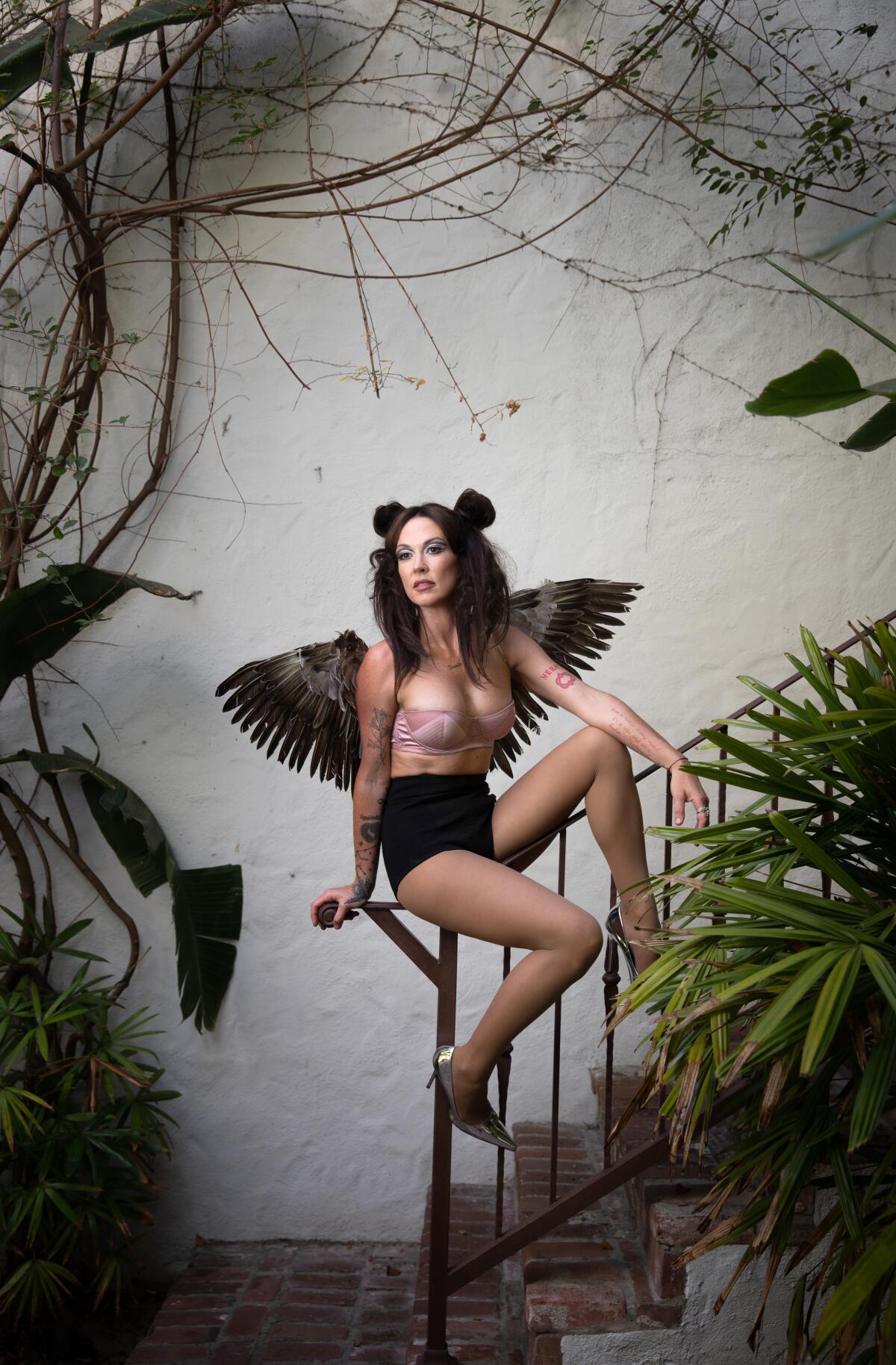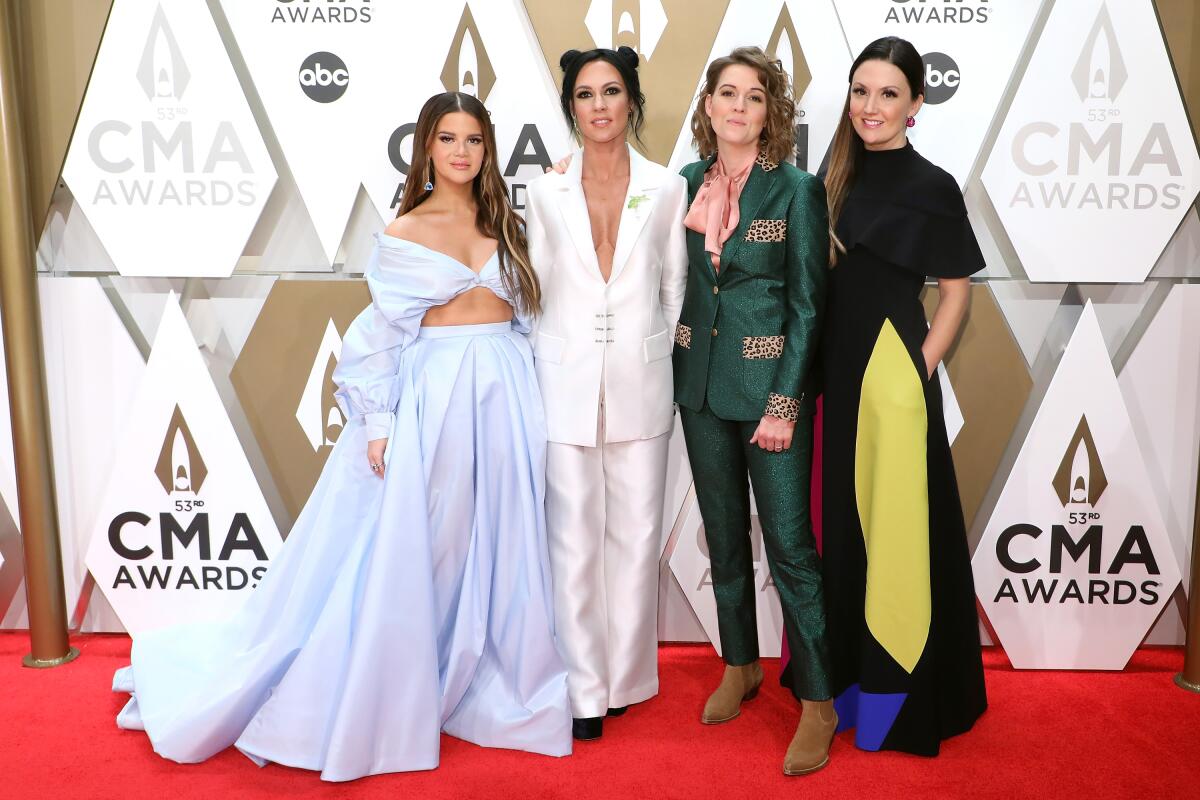The biggest entertainment stories
Get our big stories about Hollywood, film, television, music, arts, culture and more right in your inbox as soon as they publish.
You may occasionally receive promotional content from the Los Angeles Times.

Spotting a Subaru parked on the street in front of her mother’s house in a new Franklin, Tenn., subdivision, Amanda Shires couldn’t resist referencing the car’s Consumer Reports rating. She reads the magazine regularly to educate herself on these things. Her reasoning? “It’s easy to buy a lemon every day.”
As tough and discerning a customer as she may be in her shopping habits, the singer-songwriter and fiddler is even more that way in her career. She’s become a coveted presence at the intersection of nervy artistry and activism, folk and country acclaim, rock attitude and Nashville influence. Crowned emerging artist of the year at the 2017 Americana Awards on the strength of her incisive solo efforts, she’s contributed to her renowned husband Jason Isbell’s success as a member of his band, the 400 Unit, and managed to assemble a supergroup, the Highwomen, to confront prejudiced country radio programming with womanly solidarity.
You’d think that that sort of industry stature would go a long way toward securing Shires’ musical future — but there was a time, a couple of years back, when she wasn’t at all certain that she’d ever want to make another album. Completing her seventh, “Take It Like a Man,” proved monumental. In the writing and recording of it, she owned the devastating disappointments and unsatisfied but undiminished desires of a grown woman navigating complex public and private lives. Released in late July, several months after her 40th birthday, it’s the most deftly uninhibited and grandly cinematic entry in her catalog, and the one that’s received the most rhapsodic press. A game-changer even for an artist who’s been onstage for a quarter-century, who may finally receive Grammy recognition for work released under her own name.

In a music community obsessed with authenticity, Shires has the kind of back story that commands respect, and knows how to dole out its details matter-of-factly. When her mother set out glasses of iced herbal tea and an impressive tray of confections, Shires noted that the family baking skills originated with her grandfather’s incarceration at Alcatraz. “When he tried to escape the first time,” she explained, neatly breaking off a bite-size piece of pecan chocolate chip cookie, “they moved him to the kitchen to cook.”
During Shires’ Texas childhood, she was focused on musical, not culinary, skill, and persuaded her dad to spring for a cheap pawn-shop fiddle. By age 15, she was gigging with the foundational western swing group the Texas Playboys, figuring out how to improvise over jaunty jazz changes. She also hit the road with Billy Joe Shaver, a grizzled outlaw storyteller who could’ve been her granddad.
She was, as she put it, “slightly pedigreed” as a performer and keen to prioritize her singing and songwriting ahead of side musician work by the time she moved to Nashville in 2004. But her first experience in a big-budget Music Row studio was profoundly demoralizing. “I was on the microphone about to sing,” she recalled, “and [the producer] was like, ‘Less goat, more note.’”
The Grammy favorite and Joni Mitchell whisperer continues to advocate for artists who have historically been marginalized in country music.
He apparently disapproved of the vigor of her vibrato, and the struggle to deliver what the producer wanted left Shires acutely self-conscious about her voice. “You’re getting criticism that isn’t skill-based stuff,” she says. “It’s something you can’t change about yourself.”
Shires tried, though, through voice lessons. Later, she pursued a very different kind of training, a master of fine arts in poetry, equipping herself to chisel more exact imagery into her writing and hold her own in word choice debates with opinionated types.
It was a source of fascination among Americana observers when she found a romantic partner and intellectual equal in Isbell, who let the world know that she was the inspiration for his 2013 ballad of ardent, indebted devotion, “Cover Me Up.” From then on, as they ascended to power couple status, listeners would parse their lyrics for anything that could be taken as a depiction of their relationship.
When Shires was in the hospital giving birth to their daughter, Mercy, in 2015, she had to disclose to her doctor, with her husband and mother in the room, that she’d had an abortion. Five years later, Shires spelled out her experiences in a Rolling Stone op-ed advocating for abortion access. She also released “The Problem,” a ballad about a teenage couple reckoning with terminating an unplanned pregnancy, casting Isbell in the role of the supportive partner, then rounded up a wide-ranging crowd of like-minded women — Peaches, Nona Hendryx, Cyndi Lauper and Morgane Stapleton among them — for the “Our Problem” redo. Both versions benefited the Yellowhammer Fund, an Alabama nonprofit that provides contraceptive resources to economically marginalized people.
“I got really fired up and decided something had to be done in my little small patch of earth,” said Shires, one of the few Nashville songwriters willing to make such undiluted statements about politically polarizing topics. “For me, what we do with our own bodies is not doing anything to another citizen. And I think that whatever God you believe in, whoever gave you your brain also gave you the power to make those decisions. Otherwise, why would you have one?”

A while back, she started chronicling pivotal moments of musical collaboration on her skin. Touring with John Prine, she forgot a few lines of his playfully grouchy duet “In Spite of Ourselves,” and promptly went out and got an image of the Easter bunny, referenced in the song, tattooed on her arm. “Then we played the song the next day,” she recalled, “and I took my bandage off, and right when he said, ‘Get it on like the Easter bunny,’ he forgot all the words.” When Shaver died, she got ink to commemorate her tenure with him, and there were tattoos all around when she convened the Highwomen, whose lineup also boasts Brandi Carlile, Maren Morris and Natalie Hemby.
Shires achieved high points with her 2016 solo album “My Piece of Land” and 2018’s indie rock-leaning “To the Sunset,” but still there were times when a producer would demand things she couldn’t execute and dismiss what she did best. She was ready to simply play in bands and paint, and be done with her own music.
That didn’t mean that she had stopped writing songs. When the pandemic halted touring, she papered the walls with index cards full of promising song ideas, some inspired by how distant her marriage to Isbell had become. As vast as her circle of connections was, it took someone from outside of it — nonbinary, Los Angeles-based pop experimenter Lawrence Rothman — to make her feel heard. The two had been in touch since Rothman cold-emailed Shires, asking her to contribute vocals to their album “Good Morning, America.” She sent them a demo of “Fault Lines,” a portrait of home life edged in resentment and resignation, and Rothman responded quickly, suggesting that the song deserved to be recorded properly.
She wasn’t convinced. “‘Oh, no. I just wanted somebody to hear it. I’m not interesting in recording.’”

Little by little, Rothman drew her out with their patience and enthusiasm. She was floored when they tested some 15 different microphones, searching for the ideal gear to showcase her voice. “It made me like, ‘Okay, if you want me to sing like myself, I can do that. It’ll take me a minute, but I can get there.’”
Shires kept showing up, bringing songs that paired handsomely dramatic melodies with lyrics alive with restless feeling. In her singing, she summoned an elasticity that she’d only hinted at before, giving the sensations she drew to the surface an electric charge and cradling the most subtle among them, disillusionment, with great care.
“I know the cost of flight is landing,” she declared during a song she created with Rothman and initially dubbed “Common Loon,” “And I know I can take it like a man.” It was in that stout statement that she ultimately found her song and album title.
Isbell was on hand for all of this, playing guitar as he had on many of Shires’ other projects. When she contemplated shelving “Fault Lines,” anticipating that she was “going to have to talk about it or people will likely read into it,” he reassured her that it was too good and rang too true to leave off the album.
Not only will the two A-list divas likely be vying for top honors, they could be competing against Harry Styles, Bad Bunny, Taylor Swift and Kendrick Lamar.
Though she’d sung about chasing down longing before, she got far more explicit about desire, flaunting her forwardness over the undulating groove of “The Hawk for the Dove,” and attacking her fiddle solo like a wild-eyed, eruptive fantasy. During “Bad Behavior,” she relished both toying with and shrugging off the possibility of a casual hookup.
Shires gave a fair amount of thought to the implications of including those songs too. “There is sort of an idea that if you’re a married person, you’re not supposed to do all these things, or if you have kids, you’re not supposed to have these feelings,” she said. In the end, she concluded, “We should get to be sexual beings.”
That called for a new tattoo, one that Rothman and fellow artist Brittney Spencer, who sang backup on several sessions, got too. Shires is coy about whether the design on her arm depicts the hawk, as in, the pursuer, or the dove.
“You have to look closely to see.”
The biggest entertainment stories
Get our big stories about Hollywood, film, television, music, arts, culture and more right in your inbox as soon as they publish.
You may occasionally receive promotional content from the Los Angeles Times.